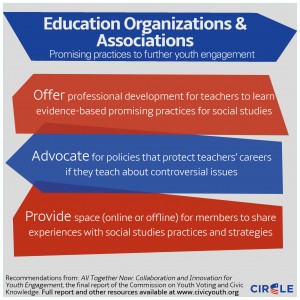Civic Learning for ‘College, Career and Civic Life’: A Role for Education Associations
Civic learning is often treated as an afterthought; something to be tacked onto more “important” subjects if time allows. However, educating students to be responsible and active citizens is a primary purpose of schooling. An effective civics education also teaches English/Language Arts and skills required for today’s workforce: collaboration, deliberation, public speaking, and more. Some civics programs have been found to boost academic success and retention, and even students’ mental health.
Yet the marginal position of civic education has led to drastic gaps in the availability of civic education in schools and a continuing trend of advantaged youth having better opportunities than their counterparts in schools that serve youth of color and low-income youth. This is especially problematic because the skills, networks, and confidence learned through effective civic education can have an even larger impact on the lives of disadvantaged youth.
One of the main conclusions of “All Together Now: Collaboration and Innovation for Youth Engagement,” the report of CIRCLE’s Commission on Youth Voting and Civic Knowledge, is the vital role of collaboration. The report finds that the simple solutions sometimes proposed for strengthening civics—such as new tests or course requirements—are very unlikely to work by themselves. A test, for example, can be helpful if it is well designed, aligned with the curriculum, and supported by professional development and good materials. If not, it can be counterproductive.
Education organizations have a particularly important role to play, both in supporting and encouraging teachers, schools, and districts to refine and strengthen their civics curricula, and in advocating for reforms at the state and national level.
For example, teachers, though very committed and enthusiastic, often lack the training and institutional support to employ high-quality civics practices, such as the discussion of current controversial issues. Additionally, state standards usually focus too much on facts and figures, and not enough on fundamental civic skills like collaboration and deliberation. Associations can provide more professional development opportunities and facilitate communication among their members about effective methods for teaching these skills, not only in social studies but across the curriculum.
For a brief overview of research findings and recommendations for education associations, click HERE. To learn more and join the conversation about how to improve civic education, go HERE.






